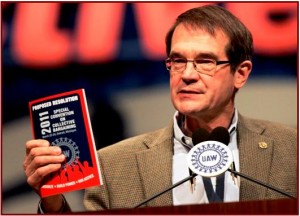
The UAW is desperate to create jobs, and reduced wages for new hires makes U.S. plants more competitive with offshore facilities.
A new four-year labor contract that will be voted on by GM UAW workers includes modest increases in wages for new hires over four years – but not veterans – and the protection or creation of more than 6,000 jobs in the U.S. at GM and its component suppliers. Long time employees will be compensated going forward largely with profit-sharing based on GM’s results in North America.
As part of the job creation promise, GM has agreed to reopen a shuttered Saturn plant in Spring Hill, Tennessee to build two new mid-size vehicles. One program is apparently a $61 million deal with 600 jobs; another is a $358 million investment with 1,110 jobs created by the UAW’s accounting. Other new jobs, ~1,800, will be created or protected in Missouri to build a mid-size pickup truck and van.
UAW local leaders endorsed the deal in Detroit today and sent it on to their more than 48,000 members for an expected, but by no means certain, ratification during voting later this week and next.
“This tentative contract provides jobs for UAW members who have been laid off over the last several years, creates thousands and thousands of new jobs for communities in desperate need of work, and brings production back to the United States that had been moved to Mexico and other parts of the world,” said UAW President Bob King.
“New investment and products for our plants and communities are the most important components of a secure future for our members and for American workers,” said King.
Jobs, investment and product guarantees in the tentative agreement include:
- Spring Hill, Tenn., plant reopens with production of two mid-size vehicles
- Warren, Mich., new transmission program
- Romulus, Mich., new engine program
- Wentzville, Mo., full shift added and new mid-size pickup program
- Saginaw, Mich., castings for next generation engine program
- Fort Wayne, Ind., next generation full-size pickup; compact vehicle at a yet-to-be determined plant
Negotiations on UAW contracts that expired last week continue at Fiat-controlled Chrysler and Ford Motor, where the same organized labor desire to create jobs exists. Automakers are trying to use the protection of existing jobs with the need to hold down costs as bargaining ploys.
If the GM contract sets the pattern, as it has in the past, a combination of both will occur, but the contentious two-tier wage system that brings in new hires at about half the pay of workers hired before 2008 will remain.
The contract to watch is the now expired and unsettled one at Ford Motor where the UAW can strike, since Ford did not except bailout funds and hence is without the requisite no strike provision in place at GM and Chrysler, which was part of the conditions of the unpopular taxpayer financed bailouts in 2009.
Insiders say Ford will not accept higher costs than those at GM and Chrysler. Two years ago, though, UAW Ford members – by a large margin – rejected cost cutting concessions to match those granted then at GM.
GM UAW workers will get a $5,000 bonus when new contract is ratified, a redesigned profit-sharing plan that will guarantee employees a minimum of $3,500 annually, as well as awards for meeting quality targets. New workers would also receive $5,000 annually in tuition assistance and additional benefits and job protections.


The UAW entered into this set of negotiations as America struggles with record levels of unemployment and an economy that shows little sign of improvement. GM, like most private and public employers across America, immediately sought givebacks in health care and pensions, but we were able to maintain those benefits and made important gains for our members to secure their jobs and create new jobs in communities across the country.
(Ashton is the UAW vice president who heads the union’s GM department – editor)